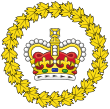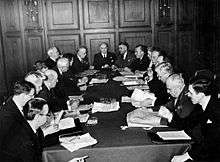Canada and the United Nations
Canada has been a member of the United Nations since it was established, and has served six separate terms on the UN Security Council. Canada has also participated in United Nations peacekeeping missions.
  | |
| United Nations membership | |
|---|---|
| Membership | Full member |
| Since | November 9, 1945 |
| UNSC seat | Non-permanent |
| Permanent Representative | Marc-André Blanchard |
 |
|---|
| This article is part of a series on the politics and government of Canada |
| Government (structure) |
|
|
|
|
|
|
Related topics
|
|
|
History

In the initial set-up of the UN, McGill University law professor John Peters Humphrey established the Division for Human Rights in the UN Secretariat, and remained in charge of the division for twenty years. The initial work of the Division for Human Rights was the creation of the Universal Declaration of Human Rights of which Humphrey created the first draft and remained a champion of until its adoption by approval of the UN General Assembly in 1948.[1]
In 1947, Canada played an important role in the United Nations Special Committee on Palestine (UNSCOP). Canada was one of the 33 countries that voted in favour of the 1947 UN partition resolution, which led to the establishment of the State of Israel despite heavy pressure from the United Kingdom on the Commonwealth of Nations
Secretary of State for External Affairs Lester B. Pearson, while he was the UN General Assembly President in 1957, proposed the concept of UN peacekeeping forces as a means of dealing with the aftermath of the Suez Crisis. He was awarded a Nobel Peace Prize for his efforts and the establishment of the United Nations Emergency Force (UNEF).[2]
Peacekeeping
The success of the Suez peacekeeping mission led Canadians to embrace peacekeeping as a suitable role for a middle-sized country, looking for a role, and having high regards for the United Nations. This led to sending a peacekeeping force to Cyprus in 1964, when two NATO members, Greece and Turkey were at swords' point over ethnic violence in the historic British colony. The Canadians left in 1993 after 28 were killed and many wounded in the operation. Peacekeeping help was needed in the Belgian Congo in 1960-64, after Belgium pulled out. There were numerous other small interventions. Canada took a central role in the International Control Commission (ICC), which tried to broker peace in Vietnam in the 1960s.[3] In 1993 violent misbehavior by Canadian peacekeeping forces in Somalia shocked the nation.[4][5]
Canada and the Security Council
Canada has served in the UNSC for 12 years, thus ranking in the top ten of non-permanent members. As of 2015, it shares the fourth place in the list of non-permanent members serving on the Council by length with Italy. This places Canada behind Brazil and Japan (first place), Argentina (second place), and Colombia, India, and Pakistan (third place). Canada was elected for the following six terms: 1948–49, 1958–59, 1967–68, 1977–78, 1989–90, and 1999–2000 - once every decade. It lost its bid for a seat in the 2010 Security Council elections, to Germany and Portugal, and in the 2020 Security Council elections, to Ireland and Norway.
National Film Board of Canada
The National Film Board of Canada (NFB), Canada's state film producer, has produced several works about or on behalf of the U.N. The first, the 1944 short film U.N.R.R.A. presents In the Wake of the Armies ... focused the work of the United Nations Relief and Rehabilitation Administration. The 1945 film Now — The Peace, on the formation of the U.N. at the Dumbarton Oaks Conference, was produced by the NFB at the suggestion of Archibald MacLeish, then-Assistant Secretary of State for Public Affairs for the U.S. government.[6][7]
See also
References
- C. P. Stacey, Canada and the Age of Conflict: A History of Canadian External Policies. Volume 2, 1921–1948: The Mackenzie King Era (1982) pp 378-85.
- Kay, Zachariah (2010). The diplomacy of impartiality: Canada and Israel, 1958–1968. Wilfrid Laurier University Press.
- Michael K. Carroll, Pearson's Peacekeepers: Canada and the United Nations Emergency Force, 1956-67 (2009)
- Sherene Razack, "From the 'clean snows of Petawawa': The violence of Canadian Peacekeepers in Somalia." Cultural Anthropology 15.1 (2000): 127-163.
- J.L. Granatstein, "The End of Peacekeeping?' Canada's History (Oct/Nov 2012) 92#5 44-51.
- Chapnick, Adam (2005-09-21). The Middle Power Project: Canada and the Founding of the United Nations. UBC Press. p. 116. ISBN 9780774812474.
- "Now - The Peace". Documentary film. National Film Board of Canada. 1945. Retrieved 28 August 2014.
